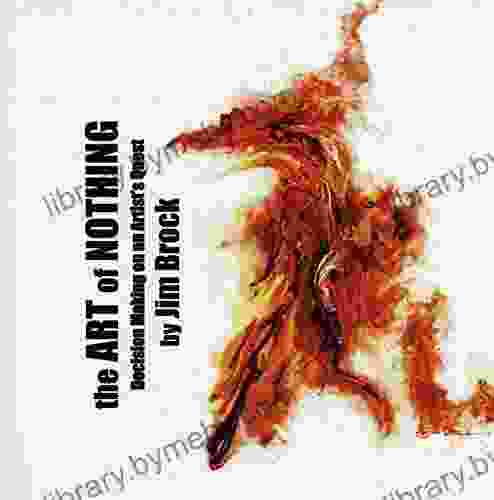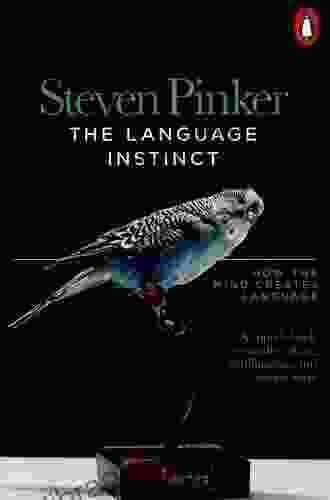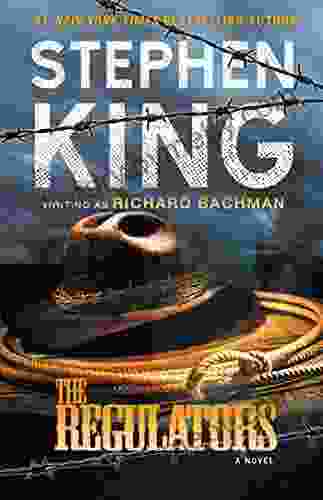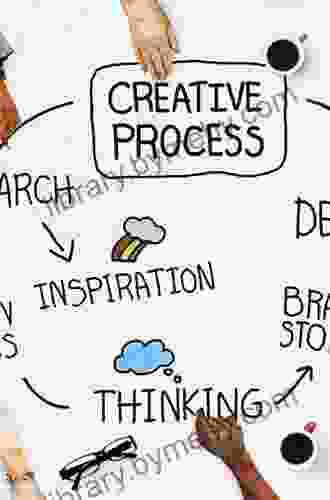How The Mind Creates Language: Unlocking the Secrets of Human Communication

Language is one of the most defining features of human beings. It allows us to communicate our thoughts, feelings, and ideas with incredible precision and complexity. But how does our mind create language? What are the cognitive processes involved in speech production, comprehension, and the development of language in children?
4.6 out of 5
| Language | : | English |
| File size | : | 1988 KB |
| Text-to-Speech | : | Enabled |
| Screen Reader | : | Supported |
| Enhanced typesetting | : | Enabled |
| Word Wise | : | Enabled |
| Print length | : | 546 pages |
In his groundbreaking book, "How The Mind Creates Language," cognitive scientist Steven Pinker explores these questions and provides a comprehensive account of the human language faculty. Drawing on the latest research in linguistics, cognitive science, and neuroscience, Pinker argues that language is not a mere collection of symbols but rather a complex system of rules that allow us to generate and understand an infinite number of sentences.
The Structure of Language
Pinker begins by examining the structure of language, arguing that it is composed of three main components: phonology, syntax, and semantics. Phonology is the study of the sounds of language and how they are combined to form words. Syntax is the study of the rules that govern how words are combined to form sentences. Semantics is the study of the meaning of words and sentences.
Pinker shows how these three components are intricately interconnected and how they work together to create the complex system that is human language. He argues that the human language faculty is unique in its ability to generate and understand an infinite number of sentences, a feat that is impossible for any other known communication system.
Speech Production
Once we have an understanding of the structure of language, we can turn our attention to the process of speech production. How does our mind take the thoughts in our head and turn them into spoken words?
Pinker argues that speech production is a complex process that involves several different stages. First, we must select the words that we want to say. Then, we must generate the phonological form of these words. Finally, we must produce the sounds of speech using our vocal cords and other speech organs.
Pinker shows how each of these stages is controlled by a different part of the brain and how they work together to produce fluent speech. He also discusses the various factors that can affect speech production, such as age, stress, and brain damage.
Speech Comprehension
Once we have spoken, our words must be understood by the person we are speaking to. This process of speech comprehension is just as complex as speech production, and it involves several different stages.
First, the listener must perceive the sounds of speech and convert them into a phonological representation. Then, the listener must parse the phonological representation into words and identify their syntactic structure. Finally, the listener must interpret the meaning of the words and sentences.
Pinker shows how each of these stages is controlled by a different part of the brain and how they work together to produce comprehension. He also discusses the various factors that can affect speech comprehension, such as background noise, distractions, and language disFree Downloads.
Language Development
One of the most fascinating aspects of language is how it develops in children. How do children learn to speak and understand their native language?
Pinker argues that language development is a gradual process that begins in infancy. He shows how children first learn to produce simple sounds and gestures, and then gradually progress to producing more complex words and sentences. He also discusses the various factors that can affect language development, such as genetics, environment, and exposure to language.
In "How The Mind Creates Language," Steven Pinker provides a comprehensive and engaging account of the human language faculty. Drawing on the latest research in linguistics, cognitive science, and neuroscience, Pinker shows how our minds create language and how we use it to communicate with each other.
This book is a must-read for anyone who is interested in the nature of human language and communication. It is a fascinating and informative exploration of one of the most defining features of human beings.

Further Reading
- How The Mind Creates Language: The New Science of Language and Mind by Steven Pinker
- The Language and Mind website
- The Language and Cognition journal
4.6 out of 5
| Language | : | English |
| File size | : | 1988 KB |
| Text-to-Speech | : | Enabled |
| Screen Reader | : | Supported |
| Enhanced typesetting | : | Enabled |
| Word Wise | : | Enabled |
| Print length | : | 546 pages |
Do you want to contribute by writing guest posts on this blog?
Please contact us and send us a resume of previous articles that you have written.
 Book
Book Novel
Novel Page
Page Chapter
Chapter Text
Text Story
Story Genre
Genre Reader
Reader Library
Library Paperback
Paperback E-book
E-book Magazine
Magazine Newspaper
Newspaper Paragraph
Paragraph Sentence
Sentence Bookmark
Bookmark Shelf
Shelf Glossary
Glossary Bibliography
Bibliography Foreword
Foreword Preface
Preface Synopsis
Synopsis Annotation
Annotation Footnote
Footnote Manuscript
Manuscript Scroll
Scroll Codex
Codex Tome
Tome Bestseller
Bestseller Classics
Classics Library card
Library card Narrative
Narrative Biography
Biography Autobiography
Autobiography Memoir
Memoir Reference
Reference Encyclopedia
Encyclopedia Tony Mcreynolds
Tony Mcreynolds Steven Rabb
Steven Rabb S Murari
S Murari Lauren H Kerstein
Lauren H Kerstein Svetlana Boym
Svetlana Boym Martin Fitzpatrick
Martin Fitzpatrick Steven Lovink
Steven Lovink Sandra Dallas
Sandra Dallas Oral Lee Brown
Oral Lee Brown Rainer Maria Rilke
Rainer Maria Rilke Momoyo Nishimura
Momoyo Nishimura Veritas Prep
Veritas Prep Laura Findley Evans
Laura Findley Evans Zeneba Bowers
Zeneba Bowers Ruth Stotter
Ruth Stotter L Blair
L Blair Sumaiya Matin
Sumaiya Matin Kyle Anthony
Kyle Anthony Leo W Chang
Leo W Chang Vicki Iovine
Vicki Iovine
Light bulbAdvertise smarter! Our strategic ad space ensures maximum exposure. Reserve your spot today!

 Mason PowellUnlock the Secrets to a Thriving Food Truck Business with "Running Food Truck...
Mason PowellUnlock the Secrets to a Thriving Food Truck Business with "Running Food Truck... Guillermo BlairFollow ·5.1k
Guillermo BlairFollow ·5.1k Andy ColeFollow ·19k
Andy ColeFollow ·19k Branson CarterFollow ·3.8k
Branson CarterFollow ·3.8k Bradley DixonFollow ·9.4k
Bradley DixonFollow ·9.4k Kyle PowellFollow ·6.4k
Kyle PowellFollow ·6.4k Harvey BellFollow ·19.6k
Harvey BellFollow ·19.6k Will WardFollow ·9.8k
Will WardFollow ·9.8k Danny SimmonsFollow ·15.3k
Danny SimmonsFollow ·15.3k

 Clay Powell
Clay PowellDiscover the Enigmatic Beauty and Profound Meaning in...
An Exploration of Emptiness, Fulfillment,...

 Brenton Cox
Brenton CoxThe Life and Times of the Woman Who Changed Abortion: The...
Norma McCorvey, the woman known...

 Darius Cox
Darius CoxBest 60 Short Hairstyles For Women With Thick Hair: A...
Embracing the beauty of...

 John Parker
John ParkerThe Healthy Pregnancy Book: Your Essential Guide to a...
Pregnancy is a...
4.6 out of 5
| Language | : | English |
| File size | : | 1988 KB |
| Text-to-Speech | : | Enabled |
| Screen Reader | : | Supported |
| Enhanced typesetting | : | Enabled |
| Word Wise | : | Enabled |
| Print length | : | 546 pages |














